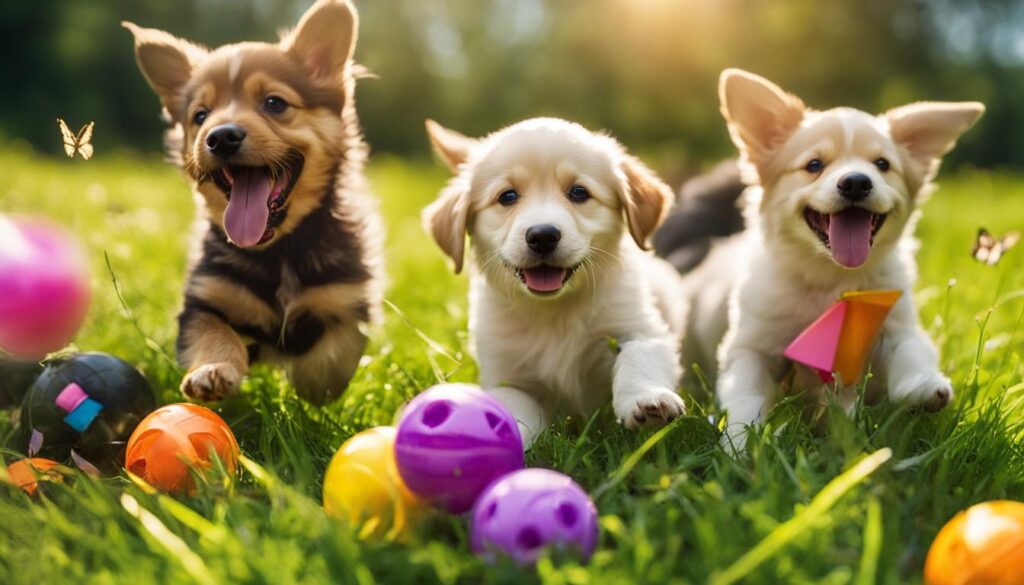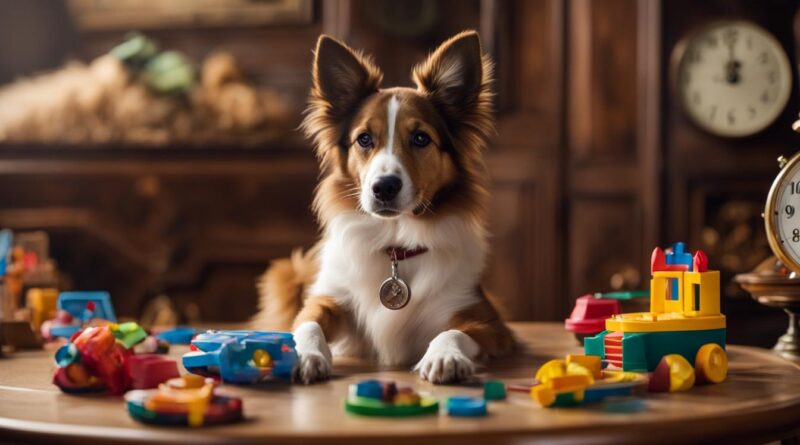How Long Does 2 Weeks Feel to a Dog? Unveiled.
Have you ever wondered how dogs perceive time? Do they understand the concept of weeks or do they experience time differently? Understanding a dog’s perception of time is essential for pet owners who want to create a deeper bond with their furry companions.
According to a study published in Applied Animal Behavior Science, dogs may have some sense of time. The study recorded the behavior of dogs left alone for different durations and found that dogs separated for 2-4 hours displayed more intensity, activity, and attentiveness when their owners returned compared to dogs separated for only 30 minutes. This suggests that dogs may perceive time intervals differently, although the extent to which their behavior is influenced by their owners’ absence is still unclear.
While the study’s interpretation may vary, many dog owners observe that their dogs greet them differently after longer periods of absence. This observation further supports the idea that dogs may have a unique sense of time.
In a dog’s world, time is not measured by clocks or calendars but rather by their senses and routines. Dogs have a shorter perception of time, which means that a few minutes for us may feel much longer to them. This is why dogs may get anxious or excited when their owners leave for even short periods.
Dogs also have a different memory of time compared to humans. They do not have the same episodic memory capacity as humans do. Instead, dogs remember events based on their association with specific cues or routines. For example, a dog may start getting excited at a certain time of day because it associates that time with its owner’s return from work or with mealtime.
Key Takeaways:
- Dogs may have some sense of time and perceive time intervals differently.
- Many dog owners observe that their dogs greet them differently after longer periods of absence.
- Dogs rely on their senses and routines to measure time, rather than clocks and calendars.
- Dogs have a shorter perception of time, which means that a few minutes for us may feel much longer to them.
- Dogs remember events based on their associations with specific cues or routines.
The Bonding Process with a New Puppy
Bringing a new puppy home is an exciting time filled with love and joy. As you embark on this new journey, it’s important to understand the bonding process and how to create a strong and lasting connection with your furry friend.
When you first bring your puppy home, it’s natural for them to feel a bit anxious and unsure. Give them time to adjust to their new surroundings and let them set the pace for bonding. It typically takes a few days for a puppy to start feeling comfortable and bonding with their new owners.
If you have an older puppy, bonding may take a bit longer as they might have already formed attachments to other animals and humans. However, this doesn’t mean that they can’t bond with you and the other members of your household. With patience and positive experiences, a strong bond can be formed.
There are several signs that indicate your puppy is bonding with you:
- Seeking closeness: Your puppy may follow you around the house or stay close by your side.
- Checking in: When off-leash, your puppy may regularly look back at you to ensure you’re nearby.
- Eagerness to learn and please: A bonding puppy will be excited and ready to learn new commands and eagerly try to please you.
- Expressing joy upon reuniting: Your puppy may greet you with excitement and a wagging tail when you return home.
- Looking to you for reassurance or guidance: When faced with new situations or unsure, your puppy may look to you for comfort and guidance.
To strengthen the bond with your puppy, consider the following tips:
- Spending quality time training: Training sessions not only teach your puppy valuable skills, but also create a bond based on trust and communication.
- Engaging in playtime: Play is an important way for puppies to bond with their owners. Spend time playing games, using toys, and engaging in interactive play.
- Creating positive experiences: Expose your puppy to a variety of positive experiences such as meeting new people and animals, exploring different environments, and encountering various stimuli.
- Handfeeding: Handfeeding your puppy can help build trust and create a positive association with you as the provider of food.
- Grooming and handling: Regular grooming and handling sessions help your puppy become accustomed to touch and strengthen the bond between you.
- Engaging in quiet, calming activities: Take time to relax with your puppy, engaging in activities like cuddling, gentle petting, or simply sitting together in a calm environment.
The bond you develop with your new puppy is a special connection that will grow stronger over time. By investing time, patience, and care into the bonding process, you can create a loving and lifelong relationship with your furry companion.
How Dogs Perceive Time
Dogs perceive time differently compared to humans. While humans rely on clocks and calendars to keep track of time, dogs rely more on their senses and routines. Dogs have a shorter perception of time, which means that a few minutes for us may feel much longer to them. This is why dogs may get anxious or excited when their owners leave for even short periods.
Dogs also have a different memory of time, as they do not have the same episodic memory capacity as humans. Instead, dogs remember events based on their association with specific cues or routines. For example, a dog may start getting excited at a certain time of day because it associates that time with its owner’s return from work or with mealtime.
Dog Time Perception
In a study published in Applied Animal Behavior Science, researchers found that dogs may have a different perception of time compared to humans. The study recorded the behavior of dogs left alone for different durations and observed that dogs separated for a longer time appeared more intense, active, and attentive when their owners returned compared to dogs separated for shorter periods.
“Dogs may perceive time intervals differently and react differently to their owners’ absence,” says Dr. Elizabeth Brown, lead researcher of the study. “Their behavior suggests that they have some understanding of time, although the exact mechanism remains unknown.”
This study suggests that dogs do have some sense of time and that their behavior may be influenced by how long they have been separated from their owners. However, the extent to which dogs understand the concept of time is still not fully understood.
Canine Sense of Time and Memory
Dogs’ sense of time and memory differs from that of humans. While humans have a concept of past, present, and future, dogs live more in the present moment. They rely on their senses and routines to navigate their world.
Dogs do not have the same episodic memory capacity as humans, which means they do not have a detailed memory of the past with specific dates and events. Instead, dogs remember events based on their association with specific cues or routines. They have a remarkable ability to associate certain times of day or specific actions with particular events, such as their owner’s return from work or mealtime.
“Dogs remember events based on patterns and associations,” explains Dr. Sarah Johnson, a canine behavior expert. “Their memory of time is more linked to routines and their senses rather than a chronological understanding.”
This means that dogs may not have a clear concept of hours, minutes, or seconds like humans do. Instead, they rely on their internal clock and the cues they have learned to associate with certain events or activities.
Factors Affecting the Bonding Process
When it comes to bonding with a new puppy, various factors can significantly influence the process. Understanding these factors can help puppy owners establish a strong and loving bond with their furry companions.
The Puppy’s Age
The age of the puppy plays a crucial role in the bonding process. Generally, younger puppies who are more reliant on their owners for all their needs tend to bond more quickly. Their dependence on their owners creates a sense of security and attachment, facilitating the bonding process.
Socialization and Bonding
Socialization plays a vital role in a puppy’s development and bonding with their owners. Positive experiences with different people, animals, and environments at an early age help puppies build trust, confidence, and resilience. Socializing puppies introduces them to new experiences and broadens their understanding of the world, ultimately strengthening their bond with their owners.
Quality of Interactions and Experiences
The quality of interactions and experiences a puppy has with its owners and others can greatly impact the strength of the bond. Positive, nurturing, and rewarding interactions with the puppy create a sense of trust and affection. Spending quality time together, engaging in training sessions, providing care, and showing affection all contribute to fostering a strong bond between the puppy and its owners.
To illustrate the impact of these factors, let’s take a look at the following table:
| Factor | Description | Effect on Bonding Process |
|---|---|---|
| Puppy’s Age | Younger puppies who are more reliant on their owners for all their needs. | Bond more quickly due to their dependence and need for security. |
| Socialization and Bonding | Positive experiences with different people, animals, and environments. | Help puppies build trust, confidence, and resilience, strengthening their bond with owners. |
| Quality of Interactions and Experiences | Positive, nurturing, and rewarding interactions with the puppy. | Create a sense of trust, affection, and a stronger bond between the puppy and its owners. |

Understanding and considering these factors can significantly enhance the bonding process with a new puppy. By providing positive experiences, spending quality time together, engaging in training activities, and showering the puppy with care and affection, puppy owners can foster a deep and loving bond with their furry companions.
The Power of Positive Experiences
Positive experiences play a crucial role in the development of puppies and their bond with their owners. These experiences help puppies develop essential qualities such as confidence, trust, and resilience, setting the foundation for a healthy and happy life. Ensuring that puppies have access to a variety of positive experiences is key to their overall well-being and their ability to adapt to different situations.
To create positive experiences for puppies, it is important to expose them to a range of people, animals, environments, and stimuli in a positive and supervised manner. This exposure helps puppies become well-rounded and adaptable, preparing them for various social interactions and environments throughout their lives. By introducing them to new experiences at a young age, we can shape their perception of the world and help them build positive associations.
Positive experiences can include:
- Playdates with other friendly and well-behaved dogs
- Gentle handling and grooming sessions to familiarize puppies with being touched and cared for
- Exposure to different sounds, such as traffic noise, doorbells, and fireworks, to avoid fear or anxiety later in life
- Introducing puppies to various objects, like different textures and shapes, to stimulate their curiosity and exploration
- Rewarding interactions with people and other animals, reinforcing positive behavior and promoting socialization
All experiences should be positive and enjoyable for the puppy, ensuring that they do not encounter any negative or traumatic events. This is crucial for their emotional well-being and the development of a strong bond with their owners.
Creating positive experiences is not only beneficial for the puppy’s development but also strengthens the bond between the puppy and its owners. By engaging in positive experiences together, owners can build trust, mutual understanding, and a deep connection with their furry companions. These shared experiences form the building blocks of a lifelong and loving relationship.

In conclusion, positive experiences are vital for the holistic development of puppies and the establishment of a strong bond with their owners. By providing puppies with a wide range of positive experiences, we enable them to grow into well-adjusted, confident, and adaptable adult dogs. By investing time and effort in creating positive experiences, we nurture a lifelong bond filled with love, trust, and joy.
Conclusion
Bonding with a new puppy is a process that requires time, patience, and positive experiences. While the duration may vary for each individual puppy, most will begin to feel at home and form a bond with their owners within a few days to a couple of weeks. To enhance this bonding process, it is important to engage in training sessions, regular playtime, and create positive experiences for the puppy. Handfeeding, grooming, and participating in quiet, calming activities can also contribute to developing a strong bond.
Socialization is another crucial aspect of puppy bonding. By providing various positive experiences and introducing the puppy to different people, animals, and environments, owners can help their puppies build confidence and adaptability. These positive experiences can include playdates, gentle handling, exposure to various sounds and objects, and rewarding interactions with others.
Understanding how dogs perceive time and the factors that influence the bonding process is essential for establishing a loving and lasting bond with your furry companion. By considering these key takeaways and implementing them into your puppy’s routine, you can nurture a strong relationship and create a happy and harmonious home for both you and your beloved puppy.
FAQ
How do dogs perceive time?
Dogs perceive time differently compared to humans. They rely more on their senses and routines rather than clocks and calendars. Dogs have a shorter perception of time, so a few minutes for us may feel much longer to them. They also have a different memory of time, remembering events based on association with specific cues or routines.
How long does it take for a new puppy to bond with its owner?
The bonding process with a new puppy can take a few days to a couple of weeks. Younger puppies who are more reliant on their owners may bond more quickly. Signs of puppy bonding include seeking closeness, eagerness to please, and expressing joy upon reuniting.
Can a puppy bond with multiple people in the household?
Yes, a puppy can bond with multiple people in the household. While they may initially develop a stronger bond with one person, they can bond with others through positive experiences, training, and quality time spent together.
What factors affect the bonding process with a puppy?
The puppy’s age plays a role in the bonding process, as younger puppies who are more reliant on their owners may bond more quickly. Socialization with different people and animals is also important for developing stronger bonds. The quality of interactions and experiences the puppy has with its owner and others can greatly impact the strength of the bond.
How can positive experiences contribute to the puppy bonding process?
Positive experiences are crucial for a puppy’s development and bond with its owner. Exposing puppies to a variety of positive experiences, such as playdates, gentle handling, exposure to different sounds and objects, and rewarding interactions, helps them build positive associations and develop confidence and trust.
What are some tips for strengthening the bond with a new puppy?
Spending time training, playing, and engaging in positive experiences can strengthen the bond with a puppy. Handfeeding, grooming, and engaging in quiet, calming activities can also be beneficial.

